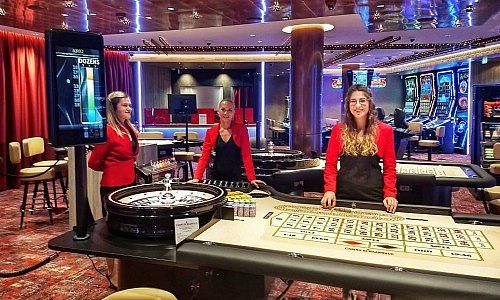After Banking Secrecy, Gambling Booms
Liechtenstein has quietly developed into a European gambling mecca. The casino boom raises awkward issues for the principality's financial center.
When a scandal over secretive bank data exposed some high-profile German tax cheats, Liechtenstein began its shift towards a «clean» financial center independent of illicit money. More than ten years after the crisis, the principality's banking industry is eager to win credit for attempts to position itself as one of the world's most sustainable financial centers.
But beneath the surface of a booming impact finance industry, Liechtenstein is also experiencing a boom in gambling. The 38,000-person nation is already home to two casinos, and three more have applied for gambling concessions. Most recently, a casino in Ruggell – a village of roughly 2,000 near the Swiss border – received permission to build another just south of Vaduz, the capital.
Tax Windfall
If all three are granted, Liechtenstein will become a mecca for gambling, with one casino for every 7,600 residents. The metric far outstrips the per capita share in better-known gambling centers like Macau, Las Vegas, and Monaco, which is home to four casinos per 39,000 residents.
The strategy is an attractive one for Liechtenstein's economy: the country took in 12 million Swiss francs ($12 million) in taxes on casino gambling, compared to 3.3 million francs budgeted. The government is factoring in a similar windfall for the next two years.
Tarnished Reputation
The boom has raised awkward questions for Liechtenstein's financial industry, which was thrown into an existential crisis when ex-Deutsche Post boss Klaus Zumwinkel and others were exposed in 2008 as tax dodgers when a data thief sold confidential client data from LGT, a private bank in Vaduz.
The banking industry says it has worked hard to clean up since – the government has pursued a «clean money» strategy. Banks like LGT, VP Bank, and Liechtensteinische Landesbank have since embarked on aggressive international expansions in the hunt for fresh sources of revenue.
Casino Crisis?
Now, some observers fear that the boom of casino gambling could eventually backfire and result in a similar scandal. One reader in Liechtenstein's local «Volksblatt» (in German) complained of a «homegrown casino problem» that is worsening by the day.
Liechtenstein's banking lobby is behind the principality's sustainable finance strategy, the successor to the shift to clean money after banking secrecy was dropped. CEO Simon Tribelhorn says he is worried about the country's reputation as a result of the casino boom.
Private Bankers Fret
«For us and the financial center, it remains key that we protect the high international recognition we have achieved in recent years in all compliance matters from any potential damage,» he told finews.asia. The lobby is monitoring the government's expansive policy on new casinos very closely, especially in regard to gambling addiction and potential collateral damage, he said.
- Page 1 of 2
- Next >>




















